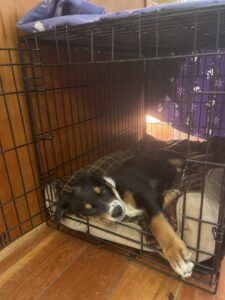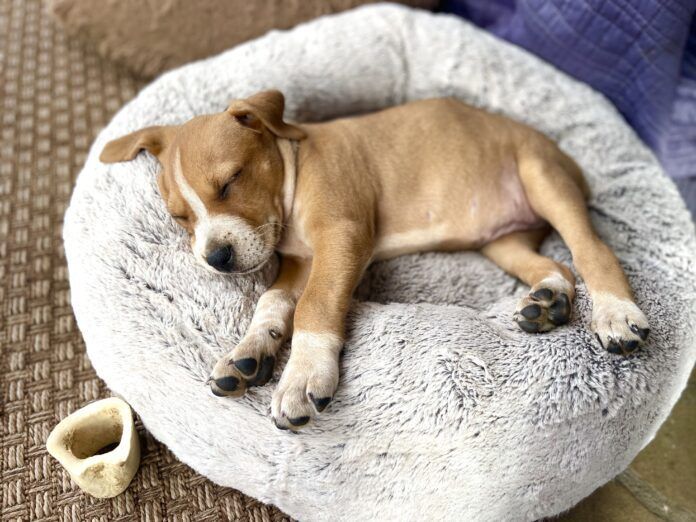Let’s say you have a puppy, but you also really love your sleep. Are you doomed? Puppies often wake up too early and cry in the middle of the night. It can take months to develop a sleep schedule that jibes with yours. Can anything be done to avoid sleep deprivation?
Yes! The following are the most common things that keep puppies from sleeping through the night. If you proactively address each of them, you’ll give your entire household a better shot at regular sleep throughout puppyhood.
Is Your Puppy Lonely?
When you bring a puppy home, it’s probably the first time she’s ever been separated from her littermates. During the day, you might be able to distract her enough that she feels OK, but every other night of her little life she has been snuggled into a warm pile of breathing, nestling siblings. Sleeping alone may well feel impossible or make her wake far too early.
So this first week in particular, keep her company as she adjusts to her new life with you. Your kind presence, soothing voice, and warm hands can help so much. You might:
- Sleep on the couch next to her pen/crate.
- Keep her crate right next to your bed.
- Place a tiny soft-sided crate alongside you in bed.
- Bring her in bed with you, where you can cuddle her just like her littermates did. The last is our choice, and it results in the most sleep for us by far. (This doesn’t do all the terrible things you may have heard it does! See “Sleeping With Your New Puppy,” for encouragement.)
Also, don’t dismiss the “companionship” and comfort of anything warm! For some pups, a hot water bottle wrapped in a cozy (or furry) blanket will help them sleep through the night. So can a Snuggle Puppy, which has a safe warming feature and a simulated heartbeat.

Does Your Puppy Have to Go to the Bathroom?
Everybody assumes that their puppy is waking up because he has to pee or poop, but in my experience that’s usually not the issue. (That’s why I started with loneliness, which is the most common culprit.)
Sure, if your puppy is crying and you take him outside he will pee. Unfortunately, you’ll likely conclude that having to pee was the reason he was crying; then you’ll spend the next two months unnecessarily getting up at 2 am instead of sleeping through the night!
With the exception of toy breeds, most puppies can last a reasonable six hours even on their first night home at 8 weeks old. Your opportunity to encourage this is in the five hours before bedtime. Let’s say you’d like to sleep from 11 pm to 5 am that first week. Set yourself up for success by making sure you don’t feed anything (much) after 6 pm, and taking up the water bowl at 7 pm, allowing some sips after that but no sustained gulping. Then, sometime after 10 pm, go outside for a nice, exuberant, 15-minute romp and play session where pup can fully eliminate. Movement encourages full emptying! A quick, lazy step off of the back patio steps with a tiny tinkle is truly not the same thing and could result in a pup who really does have to eliminate again at 2 am.
Note: A puppy with a urinary tract infection or diarrhea obviously can’t hold it. Also, a pup who is awake and agitated for any of the other reasons on this list will start moving around, and that indeed may make it likely that he feels the need to eliminate. But a calm, quiet pup can typically last six hours.
Is There Too Much Noise or Light?

To increase your odds of solid sleep and a regular puppy sleep schedule, create a quiet, dark experience for your puppy. If she’s jolted awake by noise or light she’ll be either worried or excited, neither of which promotes sleep. A puppy full of questions – What was that? Are we all getting up? Is somebody playing somewhere? Is it time for breakfast? – is not a restful puppy. So block all of that input as best you can:
- Use a noise machine or a fan to mask other sounds. (In the spring, bird song that wakes up a puppy up too early is a real issue!)
- Keep lights off, use room-darkening shades/curtains, and/or put a blanket over the pup’s crate.
- Plan ahead to minimize your own movement. If you, your partner, and your puppy are sleeping in the same room, everybody goes to sleep at once. Lights out; no talking. And don’t drink a glass of water before bed that will have you trekking to the bathroom at 3 am. (This is not forever! It’s just for when pup is getting used to the routine.)
Is Your Puppy Napping at 8 pm?
One reason your pup may not be sleeping through the night is because he’s simply not tired! A very common issue is the dreaded 8 pm nap. Many puppies are absolutely wiped out at 8 pm, so they take a whopper of a nap. Their family frankly enjoys the respite from puppy antics, then wakes the pup at 10 pm for a bathroom break. After that, it’s sometimes hard for the puppy to settle down again, or, if he does, he no longer needs a giant sleep because he just got two big hours.
To combat this, think about slight adjustments to the schedule. We don’t want to force a puppy to stay awake at 8, but we can encourage an earlier, shorter nap. Maybe 6 pm to 7 pm in the crate with dinner in the form of a food-stuffed frozen Toppl, so that the nice chewing leads to sleep? Follow with an evening walk, maybe a little play with a neighbor dog, maybe some tug?
There are a million variations you can come up with, but the point is to think about manipulating this baby’s sleep schedule to your advantage by gently tweaking the rest/activity periods throughout the rest of the day.
Is Your Puppy Tired Enough?
Of course, a natural way to make sure your pup is sleepy at night is to increase the energy expended during the day. Small changes can make a big difference for the youngest of puppies. Add enrichment (and tire her out) with things like:
- A 10-minute playdate with a neighbor dog.
- A 10-minute visit to a friend’s house.
- A 10-minute walk in the local shopping center.
- Three 3-minute treat-filled training sessions.
- Meals offered not in a boring bowl but in a form that requires foraging and chewing (such as with a snuffle mat, scatter feeding, a LickiMat, etc.).
A wonderfully full day of activity can promote a nice full night of rest and prevent waking too early.
Is Your Puppy Too Hungry?
Sometimes it’s a growling tummy that’s waking up an otherwise sleepy pup. If you’re in the habit of feeding breakfast the second your pup wakes up, you might want to re-think that. As humans know, a stomach that is used to eating at a certain time learns to feel hungry at that time.
I like to set a regular puppy meal time that’s much later, well after the whole household is up. That way both her brain and her tummy won’t associate the moment of waking with eating.
Make sure to truly feed enough during the day. After five years of running a puppy playgroup, I can tell after half an hour when a puppy’s not being fed enough: they are more bitey, more jumpy, less focused, less able to wait their turn, and less able to shake off the minor insults that can result during social play.
When I ask their surprised (and super responsible) owners to just indulge me and give an extra feeding every day the next week, every single time they come back and say some version of this: “Oh my gosh. He’s a different dog. Not only is he biting and jumping less, but he’s finally sleeping all night!”
So why do people underfeed their puppies? It happens because one size does not fit all, because we are (rightly) worried about adult obesity, and because it’s pretty shocking how much food a puppy eats! But they are growing, not at a uniform pace, and not exactly like the puppy next door. So look at the individual in front of you, and make sure he’s not hungry all day!
A Healthy Puppy Sleep Schedule
Keep in mind that sleep deprivation can cause problematic behavior and moods in puppies as well as in the people who live with them! Addressing all of the most common impediments to a puppy’s good night’s sleep should put him (and you!) on track for a restful night – which everyone needs to remain healthy and happy.






